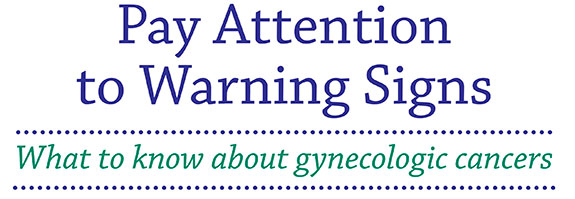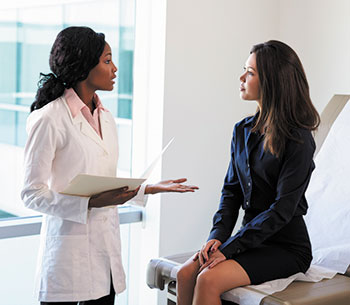
 Recently, a Carolina Woman editor spent a week on pins and needles waiting for the result of a medical test that would determine whether she had uterine cancer. Fortunately, the test came back clear. No cancer! Information is power, and we want to empower Triangle women so fewer of us spend nail-biting days waiting to hear from the gynecologist. So, we're publishing this Q&A from the Foundation for Women's Cancers, a nonprofit group based in Chicago. Do yourself a favor and read it.
Recently, a Carolina Woman editor spent a week on pins and needles waiting for the result of a medical test that would determine whether she had uterine cancer. Fortunately, the test came back clear. No cancer! Information is power, and we want to empower Triangle women so fewer of us spend nail-biting days waiting to hear from the gynecologist. So, we're publishing this Q&A from the Foundation for Women's Cancers, a nonprofit group based in Chicago. Do yourself a favor and read it.
Q. What are gynecologic cancers?
A. Gynecologic cancers are the uncontrolled growth and spread of abnormal cells originating in the female reproductive organs, including the cervix, ovaries, uterus, fallopian tubes, vagina and vulva.
Q. Who's at risk?
A. Every woman is at risk for developing a gynecologic cancer. There are about 98,000 new cases diagnosed and 30,000 deaths in the United States each year.
Q. What causes gynecologic cancers?
A. Many factors are involved. Medical research has discovered that some classes of genes, called oncogenes and tumor suppressor genes, promote the growth of cancer. The abnormal function of these genes can be inherited or acquired (through such factors as smoking, environmental influences and aging).
Almost all cervical cancers and some cancers of the vagina and vulva are caused by a virus known as HPV, or Human Papillomavirus. That's why it's important that kids get the HPV vaccination when they're 11 or 12 years old. The vaccine might even be smart for those up to age 26 who haven't received it earlier. Check with your healthcare provider.
Q. Can gynecologic cancers be prevented?
A. Diet, exercise and lifestyle choices play a significant role in prevention. But there's no way to know for sure whether you'll get a gynecologic cancer. It's important to pay attention to your body and keep on top of what's normal for you, so you can recognize any warning signs.
Screening and self-exams conducted regularly can result in the detection of certain types of gynecologic cancers in their earlier stages, when treatment is more likely to be successful and a complete cure is a possibility.
Consult your gynecologist immediately if you have abnormal vaginal bleeding or discharge. Also, see a doctor if you have these symptoms for two weeks:
- Pelvic pain or pressure
- Itching, burning, tenderness or pain of the vulva
- Changes in vulva color or skin, such as a rash, sores or warts
- More frequent or urgent need to urinate or constipation
- Bloating
- Abdominal or back pain
- Feeling full too quickly or difficulty eating.
Additionally, knowledge of family history can increase the chance of prevention or early diagnosis by determining if you may have a gene that makes you susceptible to cancer.
Q. How are gynecologic cancers treated?
A. Gynecologic cancer treatments may include one or more of the following: surgery, radiation therapy and chemotherapy. The choice of therapy depends on the type and stage of the cancer.
Q. Who provides treatment?
A. These diseases should be treated by a specialist with advanced
training and demonstrated competence, such as a gynecologic oncologist.